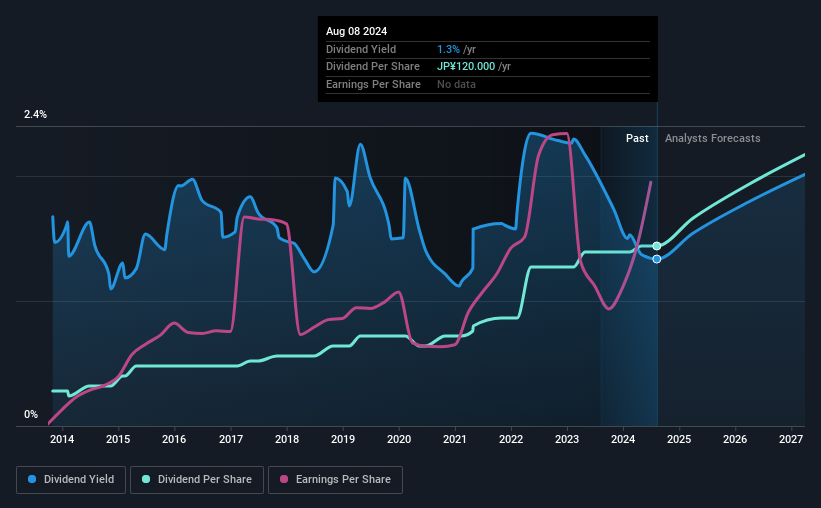- Japan
- /
- Electronic Equipment and Components
- /
- TSE:6762
TDK (TSE:6762) Is Increasing Its Dividend To ¥60.00

TDK Corporation (TSE:6762) has announced that it will be increasing its dividend from last year's comparable payment on the 4th of December to ¥60.00. The payment will take the dividend yield to 1.3%, which is in line with the average for the industry.
While the dividend yield is important for income investors, it is also important to consider any large share price moves, as this will generally outweigh any gains from distributions. Investors will be pleased to see that TDK's stock price has increased by 30% in the last 3 months, which is good for shareholders and can also explain a decrease in the dividend yield.
Check out our latest analysis for TDK
TDK's Earnings Easily Cover The Distributions
Unless the payments are sustainable, the dividend yield doesn't mean too much. However, TDK's earnings easily cover the dividend. As a result, a large proportion of what it earned was being reinvested back into the business.
Looking forward, earnings per share is forecast to rise by 10.0% over the next year. If the dividend continues along recent trends, we estimate the payout ratio will be 27%, which is in the range that makes us comfortable with the sustainability of the dividend.

Dividend Volatility
Although the company has a long dividend history, it has been cut at least once in the last 10 years. Since 2014, the dividend has gone from ¥23.33 total annually to ¥120.00. This works out to be a compound annual growth rate (CAGR) of approximately 18% a year over that time. Despite the rapid growth in the dividend over the past number of years, we have seen the payments go down the past as well, so that makes us cautious.
The Dividend Looks Likely To Grow
With a relatively unstable dividend, it's even more important to evaluate if earnings per share is growing, which could point to a growing dividend in the future. TDK has seen EPS rising for the last five years, at 16% per annum. TDK definitely has the potential to grow its dividend in the future with earnings on an uptrend and a low payout ratio.
TDK Looks Like A Great Dividend Stock
In summary, it is always positive to see the dividend being increased, and we are particularly pleased with its overall sustainability. The company is easily earning enough to cover its dividend payments and it is great to see that these earnings are being translated into cash flow. Taking this all into consideration, this looks like it could be a good dividend opportunity.
Market movements attest to how highly valued a consistent dividend policy is compared to one which is more unpredictable. Meanwhile, despite the importance of dividend payments, they are not the only factors our readers should know when assessing a company. For instance, we've picked out 1 warning sign for TDK that investors should take into consideration. If you are a dividend investor, you might also want to look at our curated list of high yield dividend stocks.
Valuation is complex, but we're here to simplify it.
Discover if TDK might be undervalued or overvalued with our detailed analysis, featuring fair value estimates, potential risks, dividends, insider trades, and its financial condition.
Access Free AnalysisHave feedback on this article? Concerned about the content? Get in touch with us directly. Alternatively, email editorial-team (at) simplywallst.com.
This article by Simply Wall St is general in nature. We provide commentary based on historical data and analyst forecasts only using an unbiased methodology and our articles are not intended to be financial advice. It does not constitute a recommendation to buy or sell any stock, and does not take account of your objectives, or your financial situation. We aim to bring you long-term focused analysis driven by fundamental data. Note that our analysis may not factor in the latest price-sensitive company announcements or qualitative material. Simply Wall St has no position in any stocks mentioned.
About TSE:6762
TDK
Engages in manufacture and sale of electronic components in Japan, Europe, China, Asia, the Americas, and internationally.
Flawless balance sheet and fair value.
Similar Companies
Market Insights
Community Narratives




